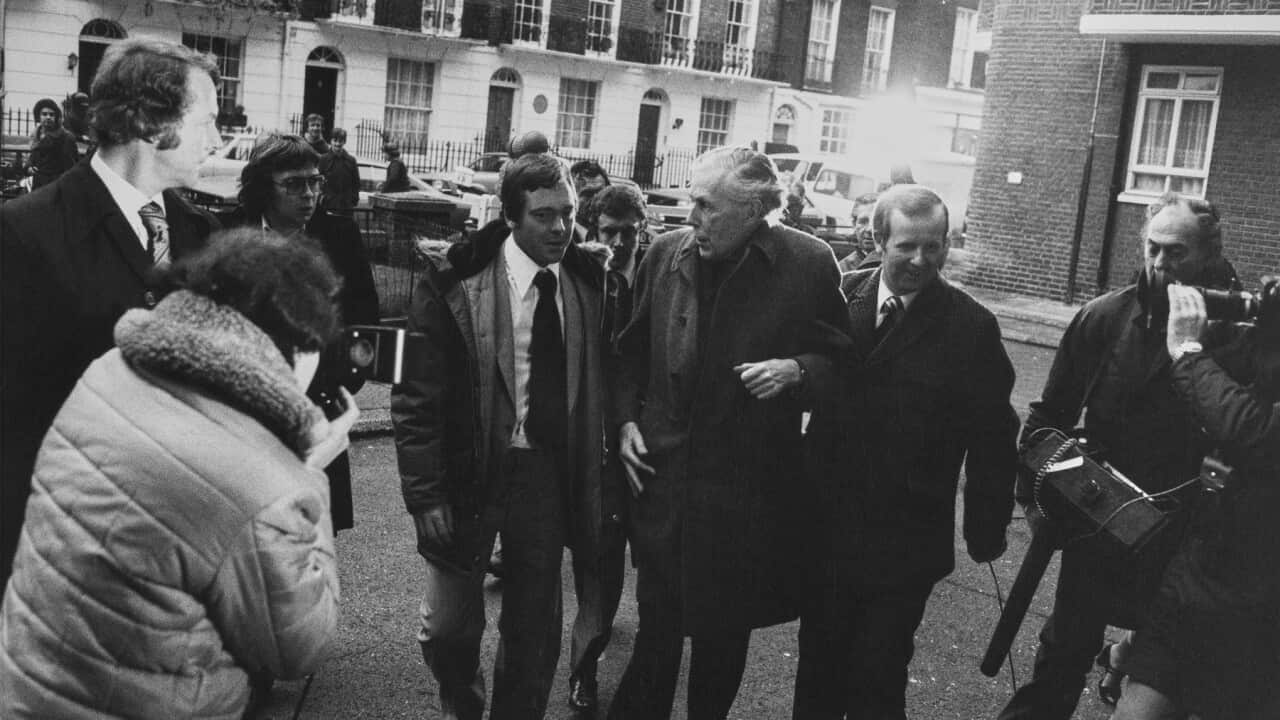TRANSCRIPT
NEWSREADER: "Blunt says he put his conscience before his country. he says there must have been more Soviet spies. Good evening..."
It was a scandal that took years to emerge.
In 1964 Art historian Anthony Blunt, who worked at Buckingham Palace as Surveyor of the Queen’s Pictures, finally confessed that as a senior MI5 officer during World War II, he had passed secret information to the Soviet KGB spy agency.
He continued to work for the Royal Family until November 1979, when his double life was exposed by the satirical magazine Private Eye.
He had been allowed to keep his job, his knighthood and his social standing in return for the information he provided.
In 1979 he was interviewed by the British TV news organisation, ITN.
He claimed the information he gave the Soviets would not have harmed British personnel
"The information that I passed to them was almost exclusively about German intelligence services, and that was largely information which, again, as I said in in my statement, a lot of people in MI5 thought ought to have been given officially. I had, in fact, no information about the British, none about British agents at all. And I wasn't connected with that aspect of, with the section of MI5 that would have been connected with that aspect of MI6 at all. And I had no information about military defences or military, anything to do really with the military side."
In the interview, he was asked how he reconciled the fact that he was both a traitor, and working for the Royal Family
"Simply you may say this is schizophrenic. But I felt that I was I'd been given a job to do, and I felt I could go on doing it for the Royal Collection"
It wasn't just the royal establishment that accepted Blunt as one of their own; Art Historian Anita Brookner - who worked with Blunt at the Courtauld Institute - told the BBC in 2022 that she remembers him fondly.
“Well I was very impressed. Not only was he prestigious, he was also immensely kind to young people. He put opportunities in their way."
But speaking at the time the ITN interview with Anthony Blunt was broadcast, Sir George Young, the former head of MI6 felt that Blunt's interview left much to be desired.
"Well, I felt the whole occasion was really, as befits an art historian, a very tastefully arranged sackcloth and ashes act. Perhaps that's a little unfair but I didn't feel there was much sincerity to it."
British academic, former politician and political commentator Professor Tim Wilson says it's shocking that the Queen had not been told immediately of Anthony Blunt's crimes.
"But Anthony Blunt. a slippery individual, and the Queen's ignorance was a reality. it seems almost a decade she remained uninformed of Anthony Blunt's confessed treachery. Why on earth was that? This esteemed art historian, surveyor of the Queen's pictures, overseeing the royal art collection was a spy, he wasn't an ordinary man and beneath the patina of scholarly refinement lay a Soviet spy, deeply embedded in the infamous Cambridge spy ring."
The Cambridge Spy Ring was a ring of five spies, working as double agents within the U-K's security services, who passed information to the Soviet Union during the Second World War and the Cold War.
Blunt was the fourth member to be exposed, after Kim Philby, Donald Maclean and Guy Burgess.
A fifth man, John Cairncross, confessed to being a member of the group in 1979.
But, while the Queen may not have been immediately told of her Art Surveyor's double life, National Archive Curator Mark Dunton says it seems she was not completely unaware:
"We now have, for the first time, documentary evidence to show that the Queen was indeed told about the Blunt case and this comes in again, in one of the files where it said that the Queen’s private secretary had spoken to her, told her about the Blunt case. This is in 1973 and the file shows that the Queen reacted calmly and without surprise, she said that she'd had some inkling of it before.”
The declassified files also include Kim Philby’s typed confession.
In it, Philby admitted he had betrayed Konstantin Volkov, a KGB officer who tried to defect to the West in 1945, bringing with him details of moles inside British intelligence – including Philby himself.
As a result of Philby’s intervention, Volkov was abducted in Istanbul, taken back to Moscow and executed.













